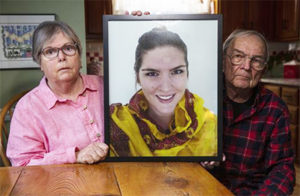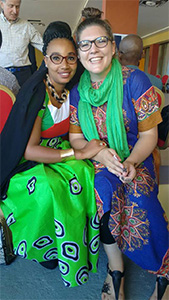Suburban Chicago family says: “Peace Corps at fault for daughter’s ‘preventable’ death” (Comoros)
UIC grad Bernice Heiderman, 24, was living her dream as a volunteer in Africa. She died of malaria, which the agency’s inspector general said was easily treatable with proper care.

Julie and Bill Heiderman with a portrait photo of their daughter Bernice Heiderman, 24, at their home in Inverness. The daughter died in 2018 of malaria that went undiagnosed by a Peace Corps physician in Comoros. Her family is suing. Anthony Vazquez / Sun-Times
Serving in the Peace Corps had been Bernice Heiderman’s dream since high school.
When the north suburban resident finally got accepted during her senior year of college, she wept with joy at the news, her family says.
But just 18 months into her tour, the 24-year-old volunteer from Inverness was dead in a spartan hotel room in the East African island nation of Comoros, the victim of what her family calls a “preventable tragedy.”
They say Heiderman endured a painful death from malaria that went undiagnosed by a local Peace Corps physician as well by a medical officer in Washington, even though the disease is endemic in Comoros.
On Friday, the family filed a wrongful-death lawsuit in federal court in Chicago against the U.S. government.
Had the local doctor “been trained properly, I know beyond a shadow of a doubt that Bernice would be alive today,” says her mother Julie Heiderman.
And the family says the mistakes that led to Bernice Heiderman’s death were compounded by bungling actions afterward — including a delay in repatriating her remains that made her miss her own funeral.

Bernice Heiderman dreamed of serving in the Peace Corps. Anthony Vazquez / Sun-Times
The 2016 graduate of the University of Illinois at Chicago was posted to the capital city of Moroni, on the Indian Ocean archipelago of Comoros. She taught English to junior high students, employing skills she’d learned volunteering at the Field Museum.
She celebrated the end of 2017 with friends but, by New Year’s Eve, felt nauseated. On Jan. 1, 2018, she texted her mother, saying she couldn’t “stop shaking from the chills” and felt “in a fog.” At her mom’s urging, she contacted the Peace Corps’ local doctor and saw him Jan. 2.
By then, the lawsuit says, the young volunteer had “headaches, dizziness, fever and vomiting” — all symptoms of malaria. But the doctor didn’t perform a rapid blood test for the mosquito-borne infection even though malaria is common there, according to the suit.
“They would have known in a matter of minutes that she had malaria, and they could have treated her,” Julie Heiderman says.
Instead, the doctor gave her aspirin and an antacid.
Later, as Heiderman’s condition worsened, he moved her to a room at a modest hotel.
As her parents worried back home, Heiderman got sicker, with frequent vomiting, chest and abdominal pain, low blood pressure and a fast heart rate.
The morning of Jan. 9, she collapsed in the bathroom and died.
A report last year from the Peace Corps’ inspector general said test kits and treatments were readily available and that, “had she received timely treatment, she could have made a rapid, full recovery.”
The doctor “had limited training in infectious diseases and limited clinical experience” in such cases, according to the report.
It noted that the agency later learned Heiderman had stopped taking her antimalarial pills — a violation of Peace Corps rules — but said a “passive and ineffective approach” meant this information wasn’t tracked. The lawsuit says Peace Corps medical personnel had told Heiderman and other volunteers incorrectly “that malaria had been eradicated from Comoros.”
The Peace Corps didn’t respond to a request for comment Friday.

Bernice Heiderman (right) in Comoros.
Last year, officials said the government agency “continues to mourn the tragic loss” and “has undertaken a rigorous internal review … and is implementing numerous changes.”
Congress passed a law in late 2018 aimed at improving medical care for Peace Corps volunteers and to strengthen oversight. The law was named for another volunteer — Nick Castle, 23 — who died in 2013 in China of gastrointestinal illness.

Julie Heiderman looks at photos of her daughter Bernice. This is the third holiday season since her death. Anthony Vazquez / Sun-Times
The Heiderman family says its anguish was compounded by what happened after her death. Instead of sending a Peace Corps representative to their home, someone phoned them to say their daughter had died.
Later, a Peace Corps representative suggested that her death was “her fault” because she “probably did not take her medication,” the lawsuit says. Another said she “never told the doctor that she needed to be tested for malaria.”
And Peace Corps officials delayed flying her body home, waiting for additional cargo to justify the expense, according to the lawsuit.
“We had her memorial service without her,” Julie Heiderman says.
When the plane carrying her body did arrive at O’Hare Airport, the Peace Corps assured the Heidermans they could go onto the tarmac to receive it, but the agency apparently didn’t clear that with the Department of Homeland Security, which initially barred them because Heiderman wasn’t in the military, according to the suit.
“I know she wasn’t military,” Julie Heiderman says, but she still was representing the United States abroad. “She said, ‘I’m serving my country, but I’m not carrying a gun.’ ”

A flag display dedicated to Bernice Heiderman’s Peace Corps service at the Heiderman home. Anthony Vazquez / Sun-Times
What a tragic and unnecessary loss of life.
Why didn’t the doctor take Bernice’s temperature? I can’t imagine such a blunder. Peace Corps policy when I served in Africa required immediate treatment for malaria for even low grade fevers.
I wholeheartedly agree that the USA needs to offer greater honors and services to PCVs who served their country under more perilous conditions than peacetime military service and conditions only a few notches less dangerous than recent wartime operations in Iraq, Afghanistan, Kuwait, Libya, Pakistan, Syria and Turkey to name a few places where many 1000s of soldiers have served under fire. My intent for comparison is not to diminish military service, but rather to elevate Peace Corps service.
I was very surprised to discover, when I crunched the numbers a few years ago, that the risk of death for US active duty soldiers was in the neighborhood of 1 in 250 for Global War on Terror (GWOT) conflicts versus 1 in 350 for all Peace Corps Volunteers since 1961. Furthermore, a PCV’s risk is shouldered solo going into impoverished nations with little more than a loving heart and a desire to make the world a better place in the name of The United States of America. Such service also requires a lot of courage and I believe it only makes sense for RPCVs to receive the same honors and benefits (life insurance,GI Bill, VA medicine, home loan guaranties) as military veterans.
Andrew,
You are absolutely right. Volunteers should have the same benefits as military men and women. Combat pay for soldiers should be sufficiently generous to compensate soldiers for the danger of war. Adminral James Stavridis made the same recommendation in his interview with CSPAN.
https://www.c-span.org/video/?472952-1/depth-admiral-james-stavridis
The comments are to questions at the end of the second hour and the beginning of the third.
Peace Corps is and have never put the health and safety of Volunteers first. It is a losing battle because really, they are unwilling to make the agency better or responsible in the realm of health care. After 36 years of working on this I gave up. Nancy Tongue
It makes me sick to read this death of a Peace Corps Volunteer that could have been prevented???
When I was a PCV in south India from 1966-68 and think our group’s medical and dental care was quite good. We saw our PC doctor quarterly for shots and to discuss any medical problems we had. At one point I had a foot infection on the bottom of one foot for which I was sent to a hospital which operated one the foot . I wasn’t given any pain medication for the procedure but cold icy water was poured over the infected area to deaden the pain and I got through it okay. I had to stay in the hospital for two day to let the foot heal enough to walk on it. On the second day the empty bed next to mine was occupied by a local women who had just given birth and she was in a lot of pain.